Best Sci-Fi Games of the Last 15 Years
From epic adventures in space to the end of the world back home, these are the very best science fiction video games of the last 15 years.
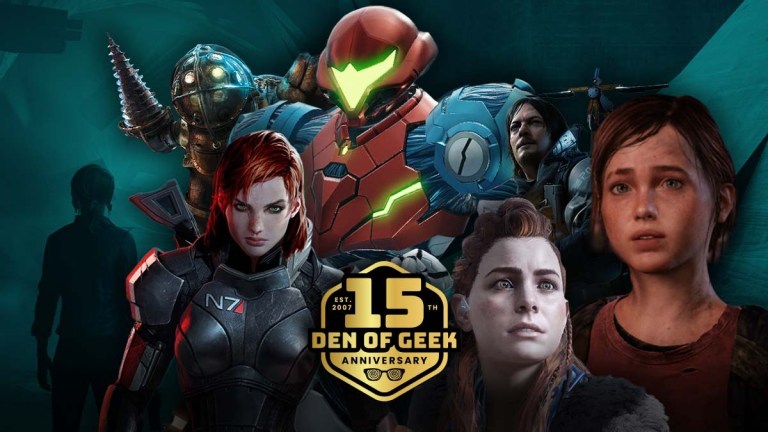
There have always been great sci-fi games. But in the last 15 years, we’ve gone from wondering what it would be like to be able to play the kind of grand sci-fi adventures we’ve seen in movies, TV shows, and books to actually playing things that now can’t be replicated in any other medium.
Yes, improvements in video game technology have contributed to sci-fi games becoming bigger and better, but science fiction has always been about so much more than fantastic technology. The best sci-fi stories often find the humanity in the alien and the intimate in the infinite, and that’s just what many of the best sci-fi games of the last 15 years do. Whether they’re taking us to the furthest reaches of outer space or offering us a peek at a not-too-distant future, gaming’s greatest sci-fi adventures allow us to control experiences that could previously only be witnessed.
As Den of Geek continues its 15th anniversary celebration this year, we’ve asked a panel of Den of Geek editors and contributors, as well as our own readers, to vote for the 25 best sci-fi games of the last decade and a half…
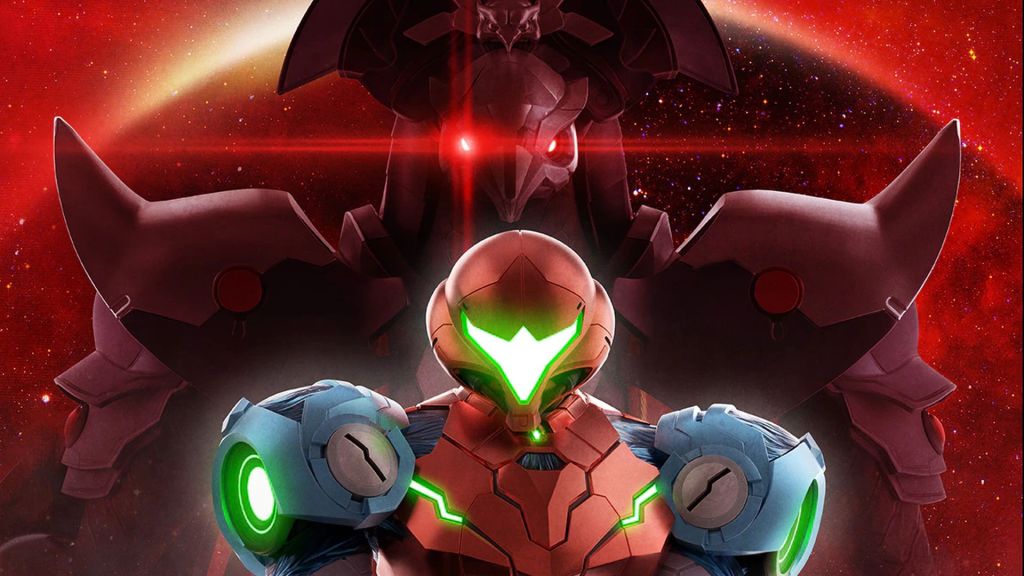
25. Metroid Dread
Even though Nintendo went almost two decades without releasing a new 2D Metroid game (Metroid: Samus Returns doesn’t count since it’s a remake), the company finally reminded gamers why they loved the franchise with Metroid Dread. Samus might be an elite bounty hunter with power armor and an arm cannon that’s tough to beat, but the game still nails a sense of dread and isolation by stranding players on a distant alien world — the only way out is through an army of hostile aliens.
Each new futuristic tool in Samus’ belt opens new pathways and methods of exploration to acquire even more weapons and abilities. Plus, Metroid Dread expands on the tense SA-X sequences from Metroid Fusion with new stealth segments that pit players against the seemingly invincible E.M.M.I robots. Now that Metroid Dread has reignited Metroid fever, audiences are even more excited for Metroid Prime 4. – Aaron Greenbaum

24. Destiny
Destiny may have provided the blueprint for a whole new subgenre of online loot shooters, but its path to becoming one of the foremost FPS universes in gaming has been anything but a smooth one. A rough launch in 2014 and an even rougher one for its sequel in 2017 may have left fans wondering if this was really truly the best an innovative studio like Bungie could do after its game-changing work on the Halo series. But in recent years, the developer has certainly ironed out many of the wrinkles that initially plagued its fan-favorite action MMO.
What’s left is an excellent shooter set in a stunning sci-fi universe with more than a few hints of fantasy along the way. While most newcomers will find the storytelling sparse, largely suggesting at plot development rather than actually telling a story, there’s no question that it tackles some huge ideas, such as the nature of AI, how a virtual world can affect reality, and the meaning of being human at a time when mortality is largely a thing of the past. Plus, there are tons of cool aliens, robots, demons, and ghosts running around for the ultimate firefight in space across exotic planets close and very far from home. Give it a go on your own, but Destiny is best experienced with a team of friends. – John Saavedra

23. The Last of Us Part II
To say The Last of Us Part II had some very big shoes to fill is the understatement of the decade. No sequel was more highly anticipated in 2020 than this follow-up to one of the greatest video games ever made. Set several years after its award-winning predecessor, The Last of Us Part II takes us back to the bleak post-apocalyptic setting and shows us how things have gotten worse for a grown-up Ellie and her adoptive father Joel. Estranged for reasons that slowly reveal themselves as the story progresses, gaming’s most beloved duo must once again come together when a mysterious woman named Abby comes knocking at their door with revenge in her heart. What ensues is one of the most well-told, heart-felt, and challenging tales written for the medium.
While some might not consider The Last of Us series to be a work of science fiction, we’d argue that it absolutely is due to the way science plays a pivotal role in both the horrifying infection that first sets this post-apocalyptic saga in motion and the possibility of a cure that looms over Ellie’s story. And a key mission of science fiction is to explore what the world of tomorrow could look like, The Last of Us Part II delivers that in spades through its vision of a pandemic-ravaged America that now hits a little too close to home in the real world. – JS
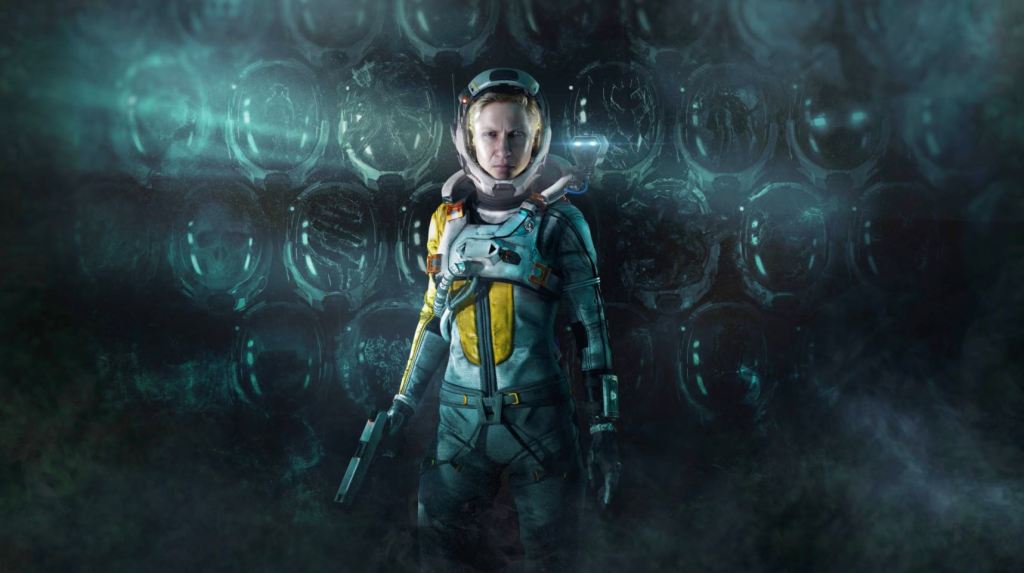
22. Returnal
Even the simple act of praising Returnal can sometimes feel overwhelming. Do you focus on the game’s brilliantly repurposed bullet-hell combat system, or is today the day you try to find the words to describe its addictive roguelike mechanics and Metroidvania level design?
Ultimately, what has stuck with me the most since I first played the best game of 2021 is that it’s arguably the most effective piece of sci-fi psychological horror I’ve ever experienced. Returnal‘s alien world becomes the setting for one of the most deeply personal horror stories ever told in a video game. The way that Returnal makes the vastness of space feel as uncomfortable and confusing as the deepest depths of that part of our mind where we bury our worst tragedies is a stunning achievement. – Matthew Byrd
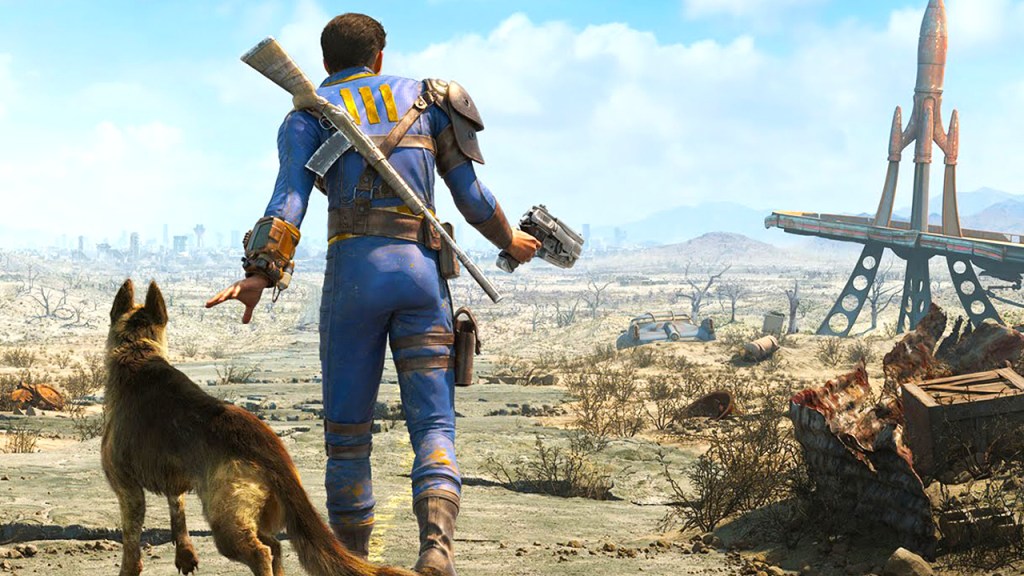
21. Fallout 4
War never changes, but Fallout has repeatedly reinvented itself over the years. The most recent single-player game in the legendary sci-fi franchise is also the pinnacle of the series thanks to more refined combat, some of the best quests of any Fallout game, and the addition of deep crafting and settlement systems. It’s also now one of the prettiest games around, now that Bethesda has added support for higher resolution and framerates.
While many other games have copied the post-apocalyptic nuclear wasteland setting, and there are quite a few excellent imitators, Fallout 4 still remains the best due to the unique world-building that constantly veers between hopeful comedy and bleak pessimism. As awful as it would be to actually live there, Fallout remains the nuclear wasteland we keep wanting to revisit. – Chris Freiberg

20. Deus Ex: Human Revolution
Deus Ex: Human Revolution remains one of the more criminally underrated sci-fi games of the 2010s. The gameplay, especially on the higher difficulty settings, is top-notch, requiring a strategic mix of stealth, hacking, and yes, straight up combat. And the series’ trademark feature of letting you successfully approach each encounter multiple different ways is on full display here.
While Human Revolution is a cyberpunk game at its core, it eschews the usual neon-drenched glow of the subgenre for a unique “cyber renaissance” art style that still makes the game stand apart more than a decade after release. Even with the arrival of many more games of its ilk in the last few years, Human Revolution is still one of the best cyberpunk games around. – CF

19. Borderlands 2
Few titles scratch that looter shooter itch quite like Borderlands 2. While the first Borderlands was slightly rough around the edges, the second entry fixed many issues and inspired a whole subgenre of sci-fi FPS games with Diablo-style progression.
Borderlands 2 draws players in with the promise of millions of futuristic guns and keeps them hooked with chaotic four-player co-op and an alien world full of dangerous monsters, bandits that look like they jumped out of a Mad Max movie, and a mysterious vault filled with extraterrestrial treasures. Add in memorable characters and a hilarious script, and you have a game that audiences love as both a sci-fi romp and loot-drenched shooter. Borderlands 2 set the bar so high, not even its sequels could measure up. – AG

18. Control
Control is the kind of game that lingers in the back of your head long after you’ve completed its mind-bending story. It’s unsettling, enthralling, and a whole hell of a lot of fun to play. As Jesse delves into the depths of the shape-shifting and haunted Oldest House, and her mind and abilities expand, the game takes on a mood and rhythm all its own, making it one of the most unique gaming experiences of the last console generation. One moment, you feel supremely empowered, flinging enemies and explosive objects around with ease. The next, you feel a crippling sense of isolation and fear, positive that the walls may literally be closing in around you.
There’s also something distinctly timeless about Control’s storytelling. Remedy explores the spookier corners of the sci-fi genre, following in the footsteps of The X-Files, Lost, Twin Peaks, and Annihilation, stories that revel in the power of mystery and the call of the unknown. Science operates perpetually on the edge of discovery, and Control underlines how horrifying the process of experimentation and discovery can be. With each bone-chilling revelation, Jesse is driven closer to madness, and as the player, we feel every bit of paranoia, pain, and regret that she does. – Bernard Boo
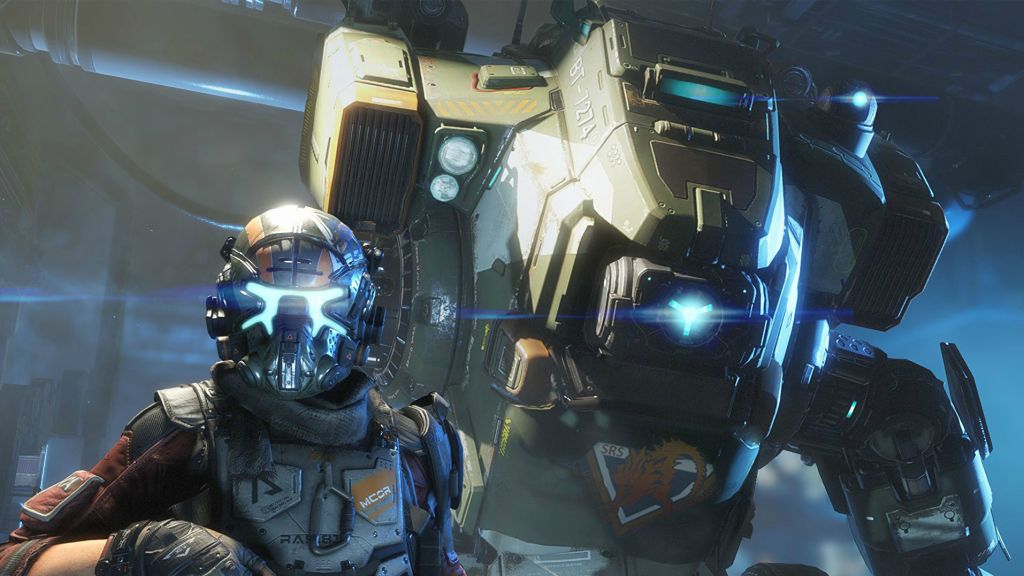
17. Titanfall 2
Back in the late 2000s when every studio was looking for “Halo killers,” Titanfall 2’s incredible sci-fi campaign and multiplayer would have almost certainly been enough to shake up the industry. Instead, the 2016 shooter failed to meet sales expectations at launch despite drawing rave reviews from pretty much everyone who played it.
Yet, much like Blade Runner and a legion of other sci-fi works that weren’t fully appreciated in their time, Titanfall 2’s legacy has only grown in the years since its release. The game’s mind-bending time manipulation mechanics obviously steal the show, but it’s really this title’s little moments, and the ways they leave you feeling emotionally invested in its characters and the worlds they inhabit, that showcase the sci-fi genre’s ability to make the fantastical suddenly feel intimate. It also doesn’t hurt that Titanfall 2’s multiplayer remains one of the best competitive FPS experiences…well…ever. – MB

16. Outer Wilds
Our fascination with exploring the deepest reaches of space has been exploited over the years by storytellers who rightfully assert that whatever may be out there may not be friendly. The Outer Wilds captures the thrill of venturing into outer space and the unfathomable chaos likely waiting for us beyond our solar system.
You only have 22 minutes to solve The Outer Wilds‘ puzzle before the sun goes supernova and you’re forced to restart the time loop you’re mysteriously stuck in. You might think a “time limit” would discourage you from exploring this game as you rush to find a way to escape the inevitable, but The Outer Wilds actually encourages you to not get so caught up with the impending catastrophe and instead admire the beauty of its doomed setting. – MB

15. Star Wars Jedi: Fallen Order
Just when all seemed lost for Star Wars game fans nostalgic for the days of the Jedi Knight and Knights of the Old Republic series, a new hope arrived courtesy of Respawn Entertainment. Jedi: Fallen Order is not only a love letter to the bygone days of LucasArts single-player action-adventure titles and RPGs, it’s a master class in modern game design. Respawn intelligently took a few cues from Dark Souls and beloved Metroidvanias to craft a Jedi game that feels both challenging and expansive. While to our modern eyes the Star Wars games of the past tend of struggle with lightsabers and Force powers, the developers make an absolute meal out of protagonist Cal Kestis’ abilities, as he takes on both the Empire and agents of the dark side across several well-known and new locations in the galaxy far, far away.
The story is also well-told. In fact, it’s one of the best Star Wars adventures of the Disney era. It not only digs deep into Jedi lore only hinted at in the movies, but also shows us what life is like under the ruthless grip of the Empire. When Cal’s Jedi lineage is revealed to a galaxy out to exterminate every last member of his ancient order, the laser bolts start flying and don’t let up until the very end of this action-packed romp through space. – JS

14. Dead Space
Even after Resident Evil 4 turned out to be a blockbuster that some at the time called the greatest game ever made, other horror gaming fans continued to doubt that an action game could ever be as scary as a slow-burn survival horror title. However, Dead Space showed that the ability to shoot a gun tends not to matter when you’re too terrified to even aim the thing properly.
Dead Space’s all-time great sound design, minimalist HUD, and scary monsters all contribute to the one aspect that often defines the best sci-fi horror: the feeling that you’re alone in a hostile environment where death feels as inescapable as the vacuum of space. Even the game’s makeshift weapons sell the idea that you are just an average person stuck in a nightmare beyond understanding. – MB

13. No Man’s Sky
No Man’s Sky had a notoriously rocky launch, but after years of extensive updates, it’s finally the sci-fi game of our dreams. The best thing about No Man’s Sky is the sense of discovery it evokes. You have an entire galaxy to explore, and thanks to the game’s impressive procedural generation, it’s impossible to say exactly what each new planet will look like, or what creatures might call it home, until you land on it. And when you do find the perfect planet to plant a flag in, you’re free to customize your very own base however you see fit.
This adventure game puts you in the driver’s seat of your own sci-fi odyssey to write the story you want. Maybe you journey to the center of the galaxy. Maybe you just hang out in a backwater solar system cataloging the local fauna. Anything and everything is possible in this massive sandbox. – CF
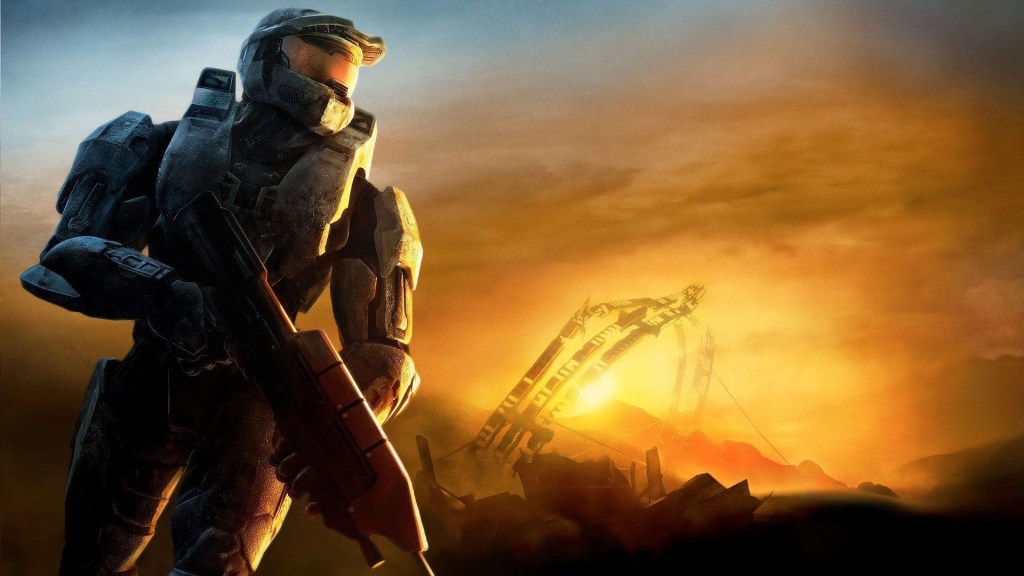
12. Halo 3
How many good threequels can you actually name? Regardless of your answer, Halo 3 would undoubtedly make it on the list. As the culmination of Bungie’s military science fiction trilogy, Halo 3 further refines the guns, melee, and grenades formula that brought the first two installments so much success. All while also dishing a story that brings an empire of flesh-hungry parasites into focus. Halo 3 cleverly turns the tables on both the Marines of the UNSC and the alien Covenant to reveal the Flood as the trilogy’s real villain.
But there’s also a much more intimate story waiting for players in this saga of galactic warfare, as Master Chief reckons with the loss of Cortana after leaving her behind in enemy territory in order to save humanity. Yet, if history has shown us anything, it’s that you just can’t keep these two apart for long. The reunion is absolutely riveting and leads to a fantastic third act on a space-station-creating space station capable of wiping out all sentient life in the galaxy. Halo 3 is 10 hours of no-holds-barred sci-fi action. – JS
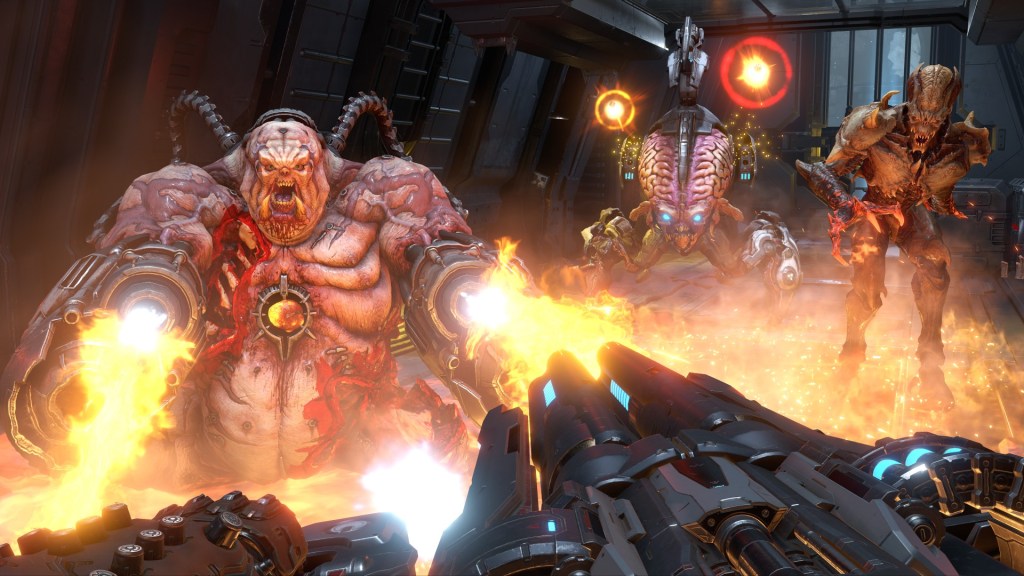
11. Doom Eternal
The granddaddy of first-person shooters still feels as relevant as ever with its most recent release. As more FPS titles embrace slower and more methodical gameplay, Doom Eternal plays more like a frantic rhythm game, demanding constant movement and alternating between guns, melee, and even a freaking flamethrower in a nonstop ballet of beautiful, gory demonic carnage.
And while Doom usually isn’t considered one of the great sci-fi stories in gaming, Eternal delves deep into series lore, with some unique twists on its own versions of heaven, hell, and the cybernetic monstrosities that dwell there. – CF

10. Alien: Isolation
There have been many Alien games over the years, and frankly, most of them aren’t very good. Even the better ones tend to stray pretty far from the source material. But the genius of Alien: Isolation is just how close it sticks to Ridley Scott’s original cinematic masterpiece. You’re not some random colonial marine with unlimited ammo mowing down hordes of xenos.
Alien: Isolation puts you in the very vulnerable role of Ellen Ripley’s daughter, Amanda. While you do have some weapons at your disposal, stealth and evasion are ultimately the only ways to see Isolation to its end. This is a tense, claustrophobic, and downright terrifying experience that expertly illustrates that not everything in the far reaches of space will be happy to see humans as we venture into the stars. – CF
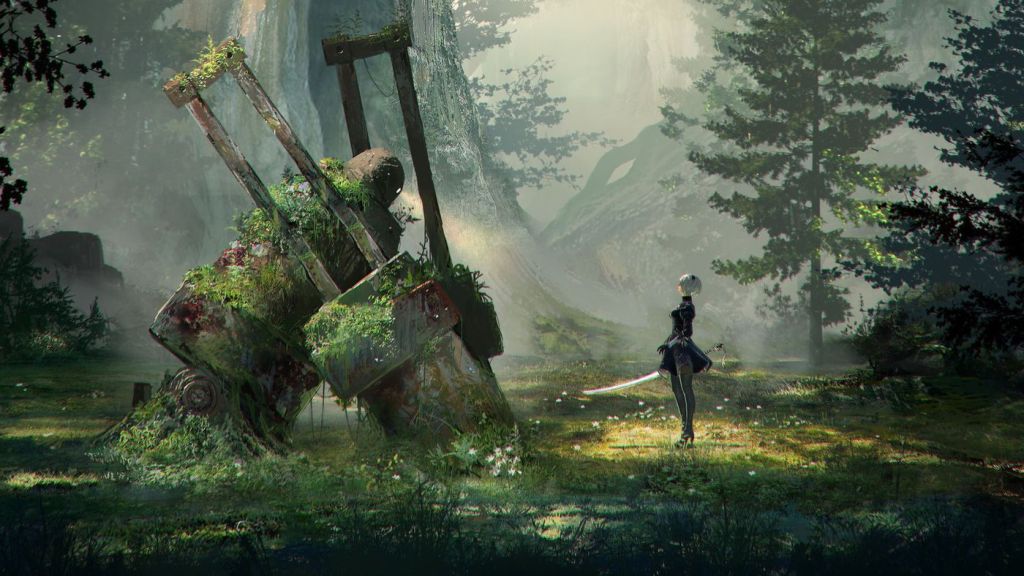
9. Nier: Automata
The first NieR game was a subversive masterpiece that, for all its fantasy trappings, was actually a stealth sci-fi story, and NieR: Automata blindsides audiences just as effectively. The game starts with an almost cliched story of combat androids defending the last human survivors against invading alien robots, but as the game progresses, the narrative throws unexpected twists that make audiences question everything they’ve experienced so far.
NieR: Automata tackles philosophical themes synonymous with artificial intelligence, such as purpose, existentialism, and the value of life. The end result is an experience that earns a place among other robot-themed greats, such as Isaac Asimov’s I, Robot. Also, each New Game+ playthrough introduces new insights and spins on NieR: Automata’s themes and overarching narrative, so players are encouraged to keep coming back for more. – AG

8. Death Stranding
There’s tranquility and turmoil to be found in Death Stranding. It’s not action-packed, and it’s not necessarily all that thrilling to play. But it recalibrates our expectations as gamers, forcing us to appreciate the simple act of land traversal in a way that no game ever has before. You walk. You sway. You stumble. You freeze in fear before a pile of rocks, which in any other game you’d bound over without so much as a thought. If you damage the leaning tower of cargo in your back, your hard work will have been for nothing.
This is the genius of Hideo Kojima. He dares to frustrate players and even risk boring them, all in the name of creating a strange, gnarled, unconventional experience you won’t find anywhere else. There are long stretches of Death Stranding that take genuine hard work to complete, which makes you feel the plight of protagonist Sam Porter Bridges (Norman Reedus) more deeply than you would if you could just breeze through his treacherous deliveries. The story seems to paint a bleak portrait of the future at first, but by the time Sam’s journey is complete, it’s revealed to in truth be a tale of hope, an ode to the power of love and empathy. – BB
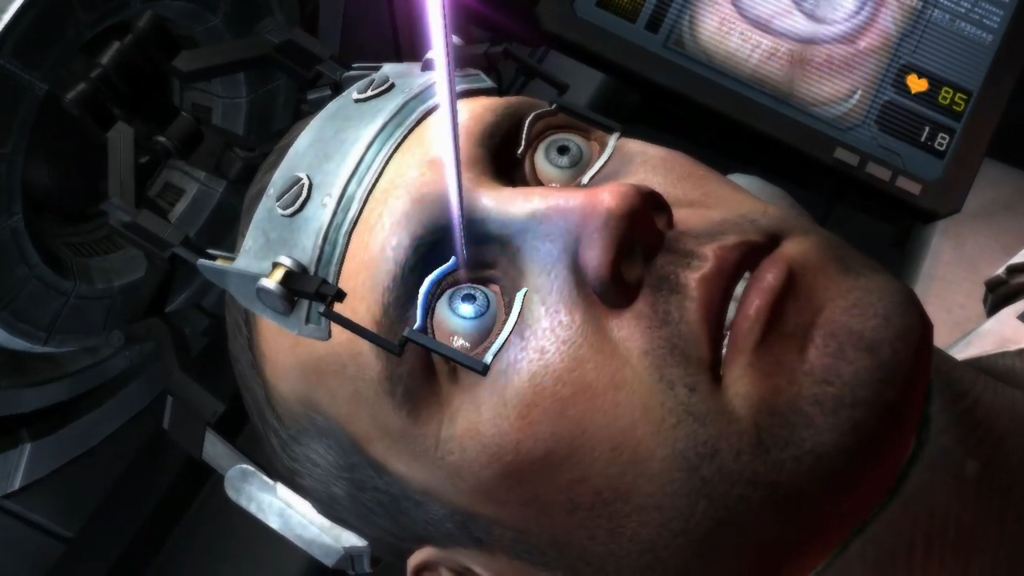
7. Dead Space 2
The original Dead Space delivered a terrifying experience that combined the isolation and claustrophobia of Ridley Scott’s Alien and John Carpenter’s The Thing with the zombie genre, and Dead Space 2 expands on that brilliance. Like the first game, Dead Space 2 weaponizes lighting and sound design to keep players on edge. Even though controls are more fluid and responsive, nowhere in the game’s sprawling space station feels safe, especially since the game’s enemies can pop out of any air vent.
Dead Space 2 also builds on the first entry’s cosmic horror angle. Players might be able to handle an army of the undead, but the source behind these creatures is so unfathomable and alien that it’ll give you chills just thinking about it. – AG
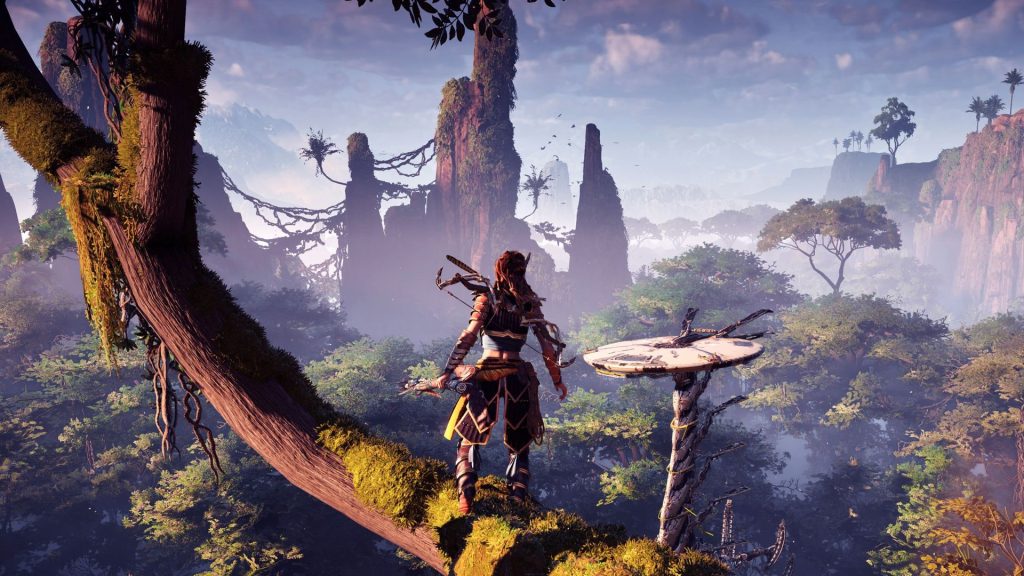
6. Horizon Zero Dawn (READER’S CHOICE)
If you were to travel back in time to the ’90s and show Horizon Zero Dawn to a bunch of kids, their freakin’ brains would melt. It’s just so cool—you explore a post-apocalyptic world, do battle with what are essentially robot dinosaurs, hack into their systems, ride them around to your heart’s content, and blow a bunch of stuff up with deadly tech arrows along the way. While the gameplay is anything but revolutionary, this game is pure wish fulfillment, and the visuals are so eye-poppingly gorgeous that there’s never a dull moment on Aloy’s epic journey of self-discovery.
It’s difficult to overstate how imaginative, colorful, and fun to explore Horizon’s game world is. And this is supremely impressive considering Guerrilla Games had never made an open-world game before. They didn’t skimp on the storytelling, either—uncovering the truths behind the apocalypse and the people who caused it makes the campaign riveting from beginning to end, and the story says something profound about modern society and our disconnect from nature. And Aloy, voiced brilliantly by Ashly Burch, is hands down one of the best protagonists of contemporary gaming. – BB
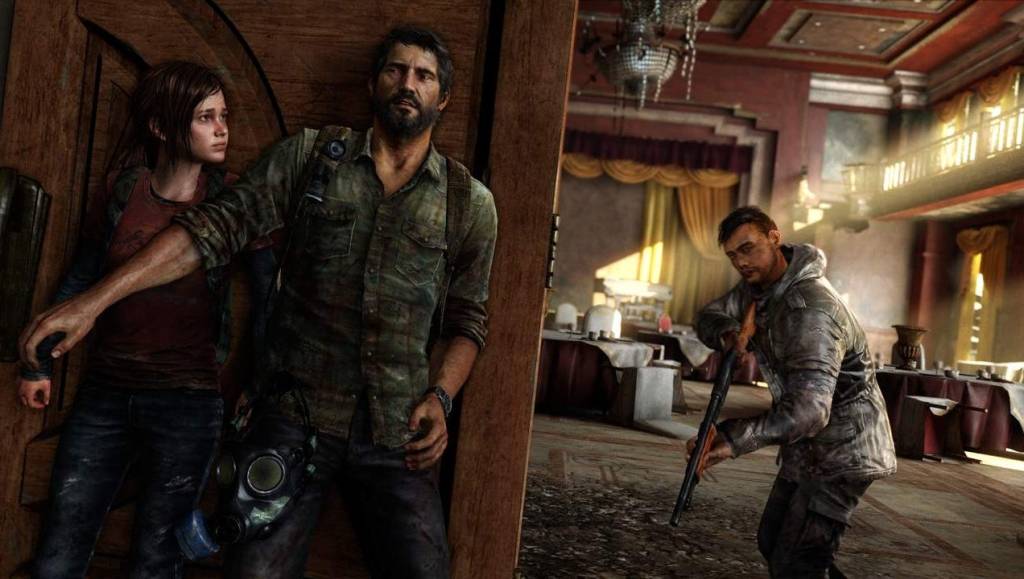
5. The Last of Us
Like horror or fantasy, sci-fi works best as a genre when it says something profound about the human condition. The Last of Us takes a sci-fi premise and uses it to unearth the humanity–and inhumanity–of its characters in beautiful, twisted ways. An outbreak of a cordyceps fungus turning the country into a veritable hellhole crawling with moaning monstrosities is intriguing enough on its own. But Naughty Dog chose to delve deeper, examining the characters’ psyches and behaviors with a level of intimacy that no video game had ever done before. Joel and Ellie’s relationship is complex and endlessly fascinating, to the point that we needed an entire second game to unpack it all.
What The Last of Us doesn’t get enough credit for is how well-designed its game design is. In a vacuum, each facet of gameplay–stealth, shooting, melee, QTE—is anything but groundbreaking. We’ve seen this stuff before. But what’s brilliant here is how every in-game action supports and is informed by the story. Each kill means something, because these aren’t just monsters who emerged from hell. They’re human beings whose minds and bodies have been overtaken against their will. And the stealth sections feel suspenseful because, well, we’re invested in Joel and Ellie as people. This is the level of nuance and sophistication that has put The Last of Us at the top of countless best-of lists over the years. – BB
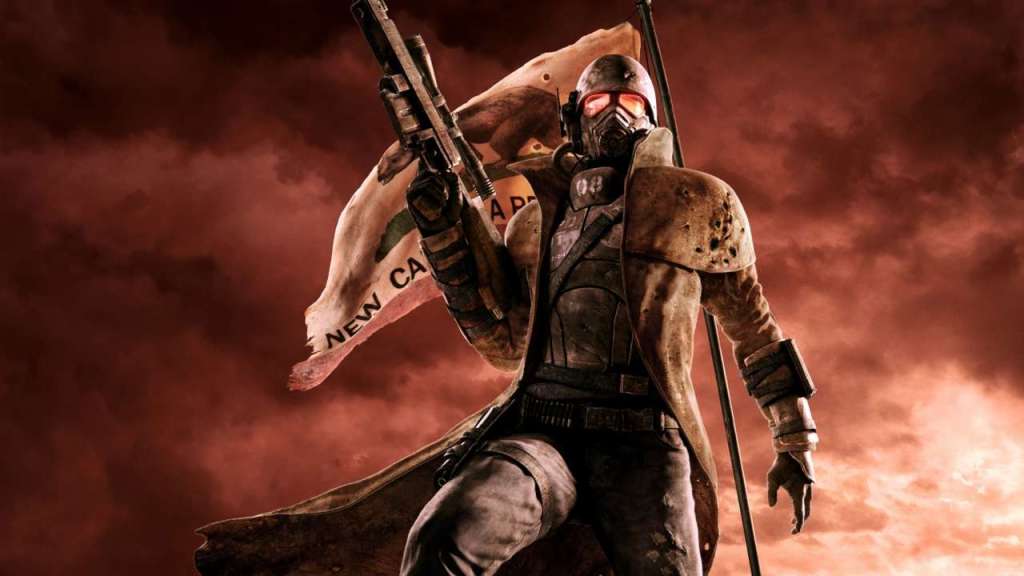
4. Fallout: New Vegas
While Fallout 3 did an incredible job of proving that the cult classic PC gaming franchise was more than ready to become a blockbuster open-world series, it’s hard not to look back and see that game as the title that paved the way for Obsidian Entertainment to show everyone all of the things that make Fallout special.
Fallout: New Vegas’ detailed post-apocalyptic world is populated almost entirely by memorable characters that feel like they could only really exist in this compelling sci-fi universe, but the true star here is the storytelling. New Vegas has this way of making you feel like the choices you make are the absolute best way to experience this morally ambiguous adventure where right and wrong are often less important than what feels right to you in the moment. There’s a great quest around every corner in New Vegas, and it’s up to you to summon the courage often needed to face it. – MB
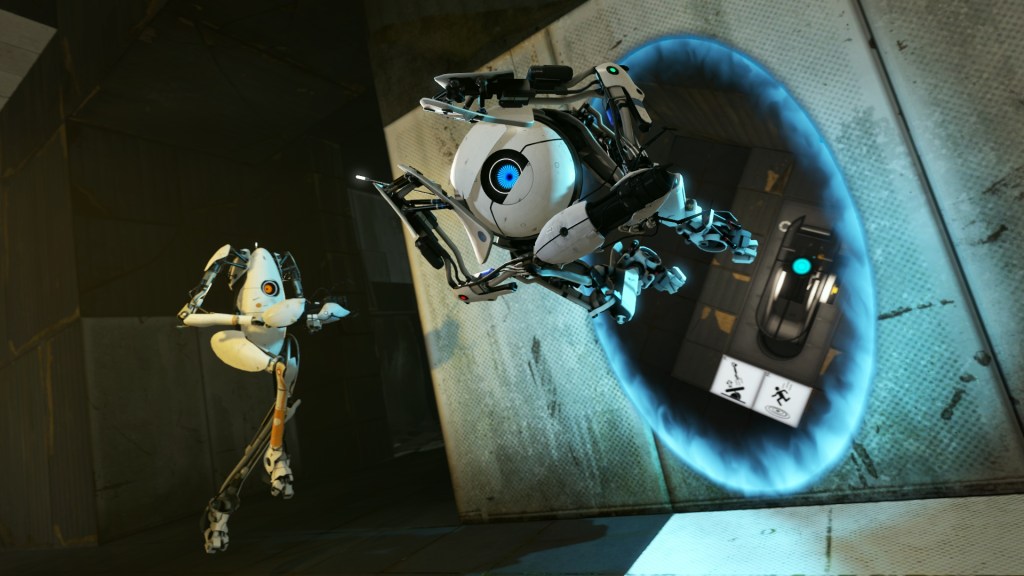
3. Portal 2
Portal was a tough act to follow. It was ingeniously designed, with gameplay mechanics that were as fun as they were clever, and an inimitable aesthetic and morbid sense of humor. But by some miracle, Valve managed to outdo themselves, evolving the physics-based, Portal Gun puzzles from the first game. New gameplay elements like the Propulsion and Repulsion Gels, Hard Light Bridges, and Redirection Cubes add several more layers to Portal 2’s puzzles.
The gameplay is immaculate on its own, but the story is what completely shatters and subverts players’ expectations and makes the game a true classic. Stephen Merchant’s performance as the stammering Wheatley is unbelievably good, and in the third act, the story actually becomes more interesting than the gameplay, which is saying a lot. The solo campaign is as essential to play as any other on this list, and on top of all of that, the two-player co-op mode is just as wonderful…but also cuter. – BB
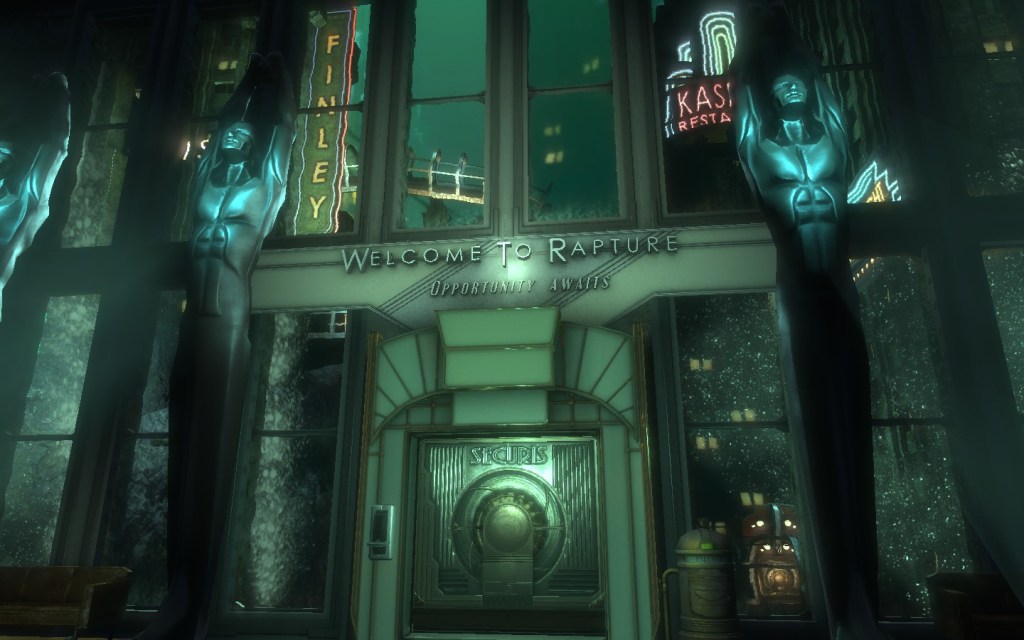
2. BioShock
BioShock hooks gamers with its storytelling. While the title is also a very polished horror shooter, BioShock’s main draw is its unique aquatic failed utopia seemingly ripped out of a pulp science fiction novel. The game’s story isn’t just an A-to-B plot but a tapestry of political messages, audio logs, and environmental storytelling that weaves together a world as believable as it is fantastic. Each piece of backstory ties into the ongoing plot and game mechanics, and also links to the overarching message that asks what happens when ideals and reality butt heads.
Admittedly, BioShock’s themes and story might feel a little heavy handed in a contemporary setting, but the game maintains a sense of poignancy thanks to its sci-fi world, as well as a plot twist that tears down the interactive medium of video games and its tropes. – AG
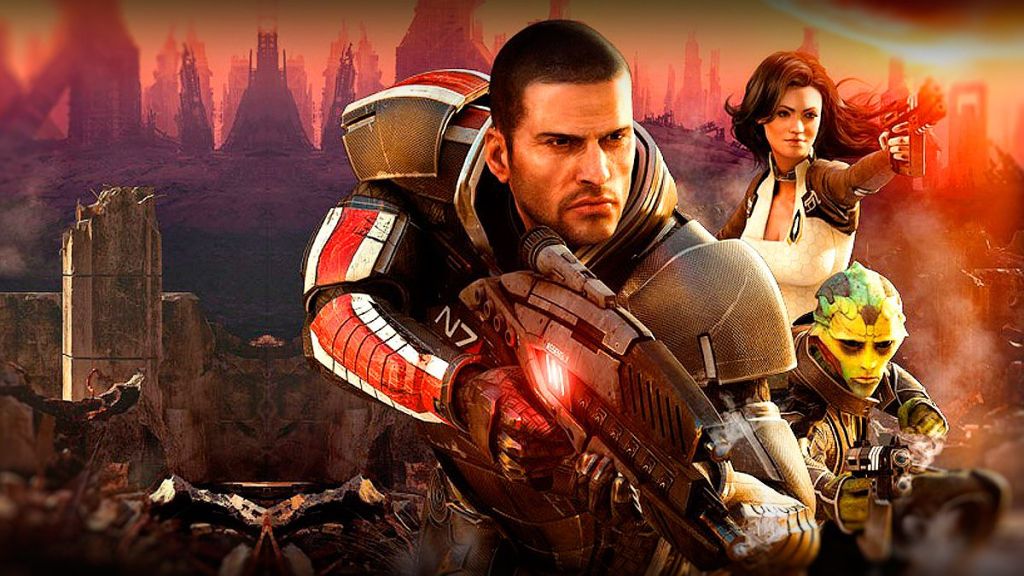
1. Mass Effect 2
What else could top a list of the best sci-fi games of the last 15 years but the best installment in one of the best sci-fi series of all time? For Mass Effect 2, BioWare took the lessons it learned from the first game and made a sequel that was better in almost every single way, while also adding a bit more edge and grit to its ensemble cast of characters and the fictional version of the Milky Way galaxy they live in. If the original sought to present a “utopian” vision of a united galaxy, here is The Empire Strikes Back of this saga, as Commander Shepard faces an early defeat that thrusts our hero into much darker corners of space than ever before.
A mysterious alien faction seeks to enslave and eradicate humanity once again and it’s up to the crew of the Normandy and their shady new benefactor to stop the destruction of all mankind. BioWare delivers an epic storyline for the game’s heroes to be sure, but it’s actually the intimate moments between Shepard and the rest of his team of soldiers and rogues that truly make this game special. Particularly in the final section of the game, Shepard must reckon with the sacrifices that need to be made to save the galaxy, all translated through a choice-based RPG experience that’s still very hard to beat so many years later. – JS
